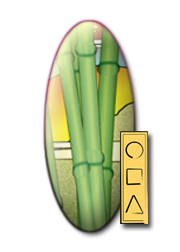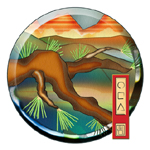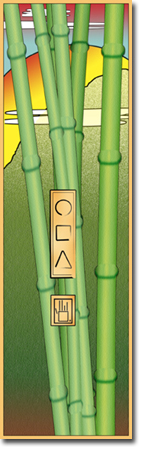On The Way: The Daily Zen Journal
The Heart of the Pine
Liu I-ming (1737-1826)

The heart of the pine is solid, the joints of bamboo are hard; therefore they do not wither in the cold of winter, but continue to flourish even through snow and frost.
What I realize as I observe this is the Tao of establishing life through cultivation and discipline. If people can avoid what is shameful, be sincere, and impartial, then their hearts will be solid. When the heart is solid, one cannot be corrupted by wealth or status, one cannot be moved by poverty or lowliness, one cannot be suppressed by authority or force.
Dealing with events fearlessly, undisturbed by difficulty, the fortunes or misfortunes one may encounter are up to others, while the creation of life is up to oneself.
If people can cultivate themselves and control their affairs, resting in the proper place, standing firm and unmoving, then they will be regulated and strong. Being regulated and strong, they do not act in any way that is improper, they do not dwell on anything but the Tao, they do not do anything unjust.
Accepting the bitter along with the sweet, able to lead and able to follow, accepting both life and death, always responsive, yet always tranquil, not moved by things, firm of heart and strong in discipline, one can thereby handle ease, one can thereby handle danger, one can thereby rest, one can thereby change adaptively without hindrance, unfixed to any given pattern, uninhibited in any way.
Roundness and Squareness

Things that are round roll, things that are square remain still. The round cannot remain stationary; the square cannot roll around—each has its own nature.
What I realize as I observe this is the Tao of using roundness and using squareness.
Roundness means being in the center of the compass. In the center of the compass, you respond adaptively according to the situation—you can go up or down be high or low, act or be still, not clinging to any one rule or method.
Squareness means being in the center of the square. In the center of the square, right and wrong are not confused—you do not behave disrespectfully, do not act unjustly, do not live in a way you should not, being inwardly autonomous.
When you can be round and can be square, following the rules of the compass and the square, then you do not fall into stagnant fixation or random suggestibility. Outwardly you are lively and active, inwardly you are calm and sure.
Using things of the world to cultivate the Tao, using human events to complete the Way to Heaven, you plant lotuses in a fire, haul a boat through muddy water, appearing and disappearing according to the time, active or passive as appropriate to the situation. Even the spirits of sky and earth cannot fathom you—how much less can your fellow human beings.
The people of the world who can be round but cannot be square, or who can be square but cannot be round, are like inert objects that are square or round, good for one thing but not for another. Right or wrong are mixed up in them—how can they attain the Great Tao?
Cutting Weeds, Planting Trees
When you cut weeds, it is necessary to dig out the roots, for if the roots are not eliminated the weeds will regrow. When you plant trees, it is necessary to nurture the roots, for if the roots are not firm the trees will wither.
What I realize as I observe this is the Tao of eliminating the artificial and cultivating the real.

People’s personal desires and habit energies are all artificial. The artificial is like weeds. People’s basic essence and natural goodness are what is real. The real is like a tree.
When you get rid of the artificial, it is necessary to root out all personal desires and habit energies; only then will they not regrow. If you leave even the slightest pollution, eventually it will grow insidiously, gradually increasing and causing great harm.
When you cultivate the real, it is necessary to be constantly aware of the fundamental root of inherent reality, nurturing it at all times, irrigating it with the water of the spirit, keeping it warm with the fire of truth, not letting it be moved or disturbed, protecting it in every way, watching out for its safety in every condition.
When you nurture the root until it is stable and firm when the energy is full and the spirit is complete, only then can you be immune to the influence of myriad things and the burden of myriad affairs. There will be no trouble after that.
Therefore, when you eliminate artificiality, you must reach the point where there is no artificiality at all, just as when you cut weeds you must eliminate the roots entirely. When you cultivate reality, you must reach the point where there is no unreality at all, just as when you plant trees you must make the roots firm and deep.
Liu I-ming (1737-1826)
Source – Awakening to the Tao – Liu I-ming and tran by Thomas Cleary 1988




The essence of Taoism and Zen emanates from the same source, and many qualities of Taoist sages sound like what you could hear from a Zen master in China. At times the dividing lines seem quite blurry.
Student: “Who preaches the wisdom of the Buddha?”
Nanyang: “Walls and stones.”
Student: “How can they teach anything—they are insentient?”
Nanyang: “They are always eloquently teaching the truth.”
Student: “I can’t hear it.”
Nanyang: “But that doesn’t mean everyone else can’t.”
Student: “Who hears it then?”
Nanyang: “All the sages do.”
What is so lovely about the Taoist sage is the direct connection with nature as the Way or Tao. In the same vein as “everyday life is the Way,” observing and learning the teachings of the natural world reveal principles deep, rich, and directly experienced.
Chao-chou asked, “What is the Tao”
The master replied, “Your ordinary mind is the Tao.”
“How can one return into accord with it?”
“By intending to accord, you immediately deviate.”
“But without intention, how can one know the Tao?”
“The Tao,” said the master, “belongs neither to knowing nor not-knowing. Knowing is false understanding; not knowing is blind ignorance. If you really understand the Tao beyond doubt, it’s like the empty sky. Why drag in right and wrong?”
Chao-chou (778-897)
Let us roll with the wheel of life gracefully and invite receptivity from our practice to assist us in learning from the teachings of the inanimate.
“Like a complete unknown, like a rolling stone” – Bob Dylan
From the heart,
Elana, Scribe for Daily Zen